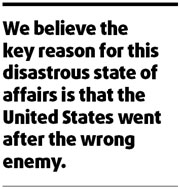Time for Iraq rethink
(China Daily)
Updated: 2008-03-20 07:20
Updated: 2008-03-20 07:20
Five years have elapsed since the start of the Iraq War, but there are people who are still trying to justify this historic blunder.
US President George W. Bush asserted in his State of the Union address in late January that "high-profile terrorist attacks are down".
According to figures released by the Bush administration, there have been fewer terrorist attacks in Iraq since the 30,000-strong US troop surge last spring.
But the drop in the number of the attacks is not proof that the Iraq War has turned for the better, nor does it suggest that the US invasion of Iraq was anything other than a huge mistake. About 4,000 US troops have been killed in this war.

The World Heath Organization estimates that Iraqi civilian deaths must have reached 150,000 in June last year. How many more have been killed since then?
"Baghdad Burning", an English-language blog by an Iraqi girl, contains this passage: "The tears had stopped about an hour after we'd left Baghdad. Just seeing the dirty streets, the ruins of buildings and houses, the smoke-filled horizon all helped me realize how fortunate I was to have a chance for something safer." This is her recollection of the day she and her family left Baghdad last year to seek safety in Syria.
More than 2 million Iraqis have fled their country to become refugees. Another 2 million Iraqis have become displaced. For these people, Bush's speech must have sounded as if it came from another planet.
The justification for this war, which Bush used to argue fervidly, has since evaporated completely. Contrary to the Bush administration's insistence, the weapons of mass destruction did not exist. And hardly anybody is talking anymore about the once-popular slogan of "democratizing the Middle East".
Bush's popularity back home is abysmal. In other countries that sent their troops to Iraq in support of Bush's war, not a few leaders have since been driven out of power by popular vote or due to low job approval ratings.
We believe the key reason for this disastrous state of affairs is that the United States went after the wrong enemy. What Washington should have done was to seek the support of the Arab-Islamic world to isolate and drive al-Qaida into a corner.
Instead, the Bush administration declared war on Saddam Hussein and his government - which had nothing to do with al-Qaida - for the most spurious of reasons. This created a rift in the international community and made enemies of even moderate Muslims.
Bitter feelings linger in the international community, particularly in Germany and France that opposed the Iraq War. A good number of nations - even those that did not send troops to Iraq - still participated in Bush's "war against terror" in all sorts of ways because they valued their alliance with the US.
The battlefront expanded and the United Nations was helpless to exercise its influence. Japan certainly bears a part of the blame for supporting this war.
There is no panacea for ending this mess. So long as a large US military contingent remains stationed in Iraq, anti-US terrorism will continue. But withdrawing from Iraq before the situation stabilizes could trigger a civil war.
One cause for concern is that the longer the Iraq debacle continues, the US could become "worn out" not only militarily, but also economically, diplomatically, and in terms of "soft power".
The US must first face and accept the fact that it has gone against the wrong enemy, and think once again about where its true target lies.
The Asahi Shimbun
(China Daily 03/20/2008 page9)
|
|
|
|